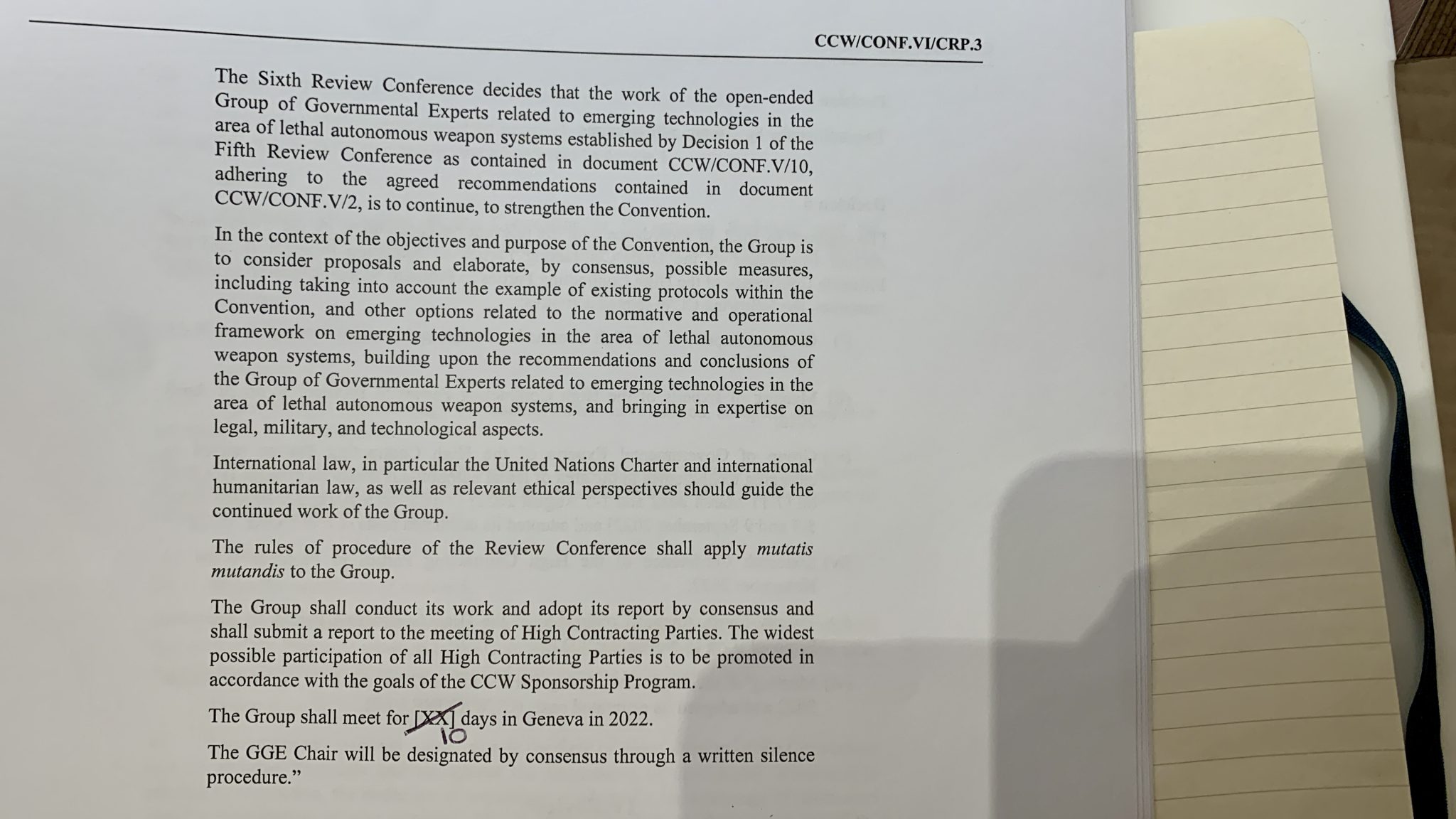At the close of the 6th Review Conference of the Conventional on Conventional Weapons (CCW), States agreed to continue the work of the Group of Governmental Experts related to emerging technologies in the area of lethal autonomous weapon systems for another year. The renewed mandate for the group agreed to hold ten days of meetings in 2022.
Historic opportunity to regulate killer robots fails as a handful of states block the majority
New hope for the start of treaty negotiations in 2022 as political leadership emerges.

After 8 years of discussions at the CCW, this mandate falls shockingly short of the outcome the world needs. The Review Conference was posed with a historic opportunity: to recognise the need to draw clear legal and moral lines to ensure meaningful human control over the use of force, and respond with a strong and focused mandate to begin negotiations on a legally binding instrument on autonomous weapons.
Instead, states are now guided by an ambiguous mandate to, “…consider proposals and elaborate, by consensus, possible measures, including taking into account the example of existing protocols within the convention, and other options related to the normative and operational framework on emerging technologies in the area of lethal autonomous weapons systems…”. This is a disgraceful representation of all of the hard work that has been done this year, and of the clear calls from the majority of states to prohibit and regulate autonomous weapons through a legally binding instrument.
After a week of substantive content being stripped away, it’s clear that a minority of states including the US and Russia, already investing heavily in the development of autonomous weapons, are committed to using the consensus rule in the CCW to hold the majority of states hostage and block progress towards the international legal response that is urgently needed. The outcome of the Review Conference falls drastically short, and does not reflect the will of the vast majority of states, civil society, or international public opinion.
Press release, 17 Dec 2021: Historic opportunity to regulate killer robots fails as a handful of states block the majority. New hope for the start of treaty negotiations in 2022 as political leadership emerges.🔗⬇️https://t.co/90Aeam74OH#CCWUN #news #pressrelease #pr #media pic.twitter.com/2d5CZeyBYm
— Stop Killer Robots (@BanKillerRobots) December 17, 2021
We have seen a clear movement toward a shared sense of how a legal response to killer robots should be structured – through a combination of prohibitions and positive obligations. Emerging political leadership shows promise that an external process is now likely and looks to be the only pathway forward to achieve substantive progress.
Austrian Foreign Minister, Alexander Schallenberg and New Zealand’s Minister for Disarmament and Arms Control, Phil Twyford have both called for the development of new international law regulating autonomous weapons. The new government coalition agreements of Norway and Germany promise to take action on this issue. There has been consistent cross regional leadership at the UN with 68 states calling for a legal instrument.
As we draw this year to a close, we will look forward to 2022 when we will work in partnership with all committed states towards the development of a legal instrument on autonomy in weapons systems. States should feel confident that outside the CCW, the majority of public opinion, experts in artificial intelligence and technology, researchers and academics, faith leaders from around the world and the UN Secretary General will be with us in that process.
Stop Killer Robots will continue to reject digital dehumanisation and work with states to ensure a world in which technology is developed and used to promote peace, justice, human rights, equality and respect for law.


